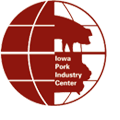 Jason Ross, the Lloyd L. Anderson Professor in animal science and director of the Iowa Pork Industry Center at Iowa State, will lead the project that includes scientists from Iowa State, Kansas State University and Purdue University. The National Pork Board and the Foundation for Food and Agriculture Research (FFAR) are providing nearly $2 million for the five-year study.
Jason Ross, the Lloyd L. Anderson Professor in animal science and director of the Iowa Pork Industry Center at Iowa State, will lead the project that includes scientists from Iowa State, Kansas State University and Purdue University. The National Pork Board and the Foundation for Food and Agriculture Research (FFAR) are providing nearly $2 million for the five-year study.
“This project is a great example of industry leadership coming together to address emerging issues through university and industry research partnerships,” Ross said.

Across the pork industry, an estimated 30 to 35 percent of pigs born die before reaching the market, creating significant economic losses for farmers. Research indicates that mortality rates across all phases of production have been increasing, presenting a major challenge to animal wellbeing and sustainability.
“The members of the animal science and welfare committees of the National Pork Board recognize improving pig health, welfare and productivity are keys in extending pig survivability,” said Chris Hostetler, director of animal science for the National Pork Board. “While this project is slated to last five years, it is the vision of the committees that this effort will fundamentally shape the way pigs are raised to provide safe, wholesome pork far into the future.”
An interdisciplinary team of nutritionists, physiologists, veterinarians, well-being and behavior experts, geneticists, toxicologists, extension specialists and economists, will examine the causes of mortality occurring on commercial swine farms.
“We know that improving survivability will increase the efficiency and environmental sustainability of the whole industry,” said Tim Kurt, FFAR’s scientific program director, “but solutions need to be economically feasible.”
“Increasing sow and piglet survivability is one of the most intractable issues facing the pork industry. While this is a clear animal welfare problem, it is also one of the most important productivity and economic issue for producers,” said Sally Rockey, FFAR’s executive director. “FFAR is pleased to be part of this important research that unquestionably will have a multitude of positive impacts.”
The project seeks a full understanding of the biological mechanisms that limit pig and sow survivability, how they interact and how they can be effectively improved.
The project’s overarching goal through effective research and extension activities is to improve swine survivability by 1 percent or more each year. Increasing the wean-to-finish survival of animals by 1 percent would represent an estimated gain in productivity of approximately 1.2 million pigs a year for the nation’s swine industry.
The research team objectives include:
- Evaluate producers’ management attitudes and economics associated with improving survivability in U.S. swine production
- Identify the causes of mortality on U.S. sow farms to support development and implementation of targeted strategies to maximize survivability
- Define factors that influence wean-to-finish survivability and implement management strategies based on production-based research
- Develop national extension, outreach and education resources and strategies to encourage adoption and implementation of management practices to improve survivability in pork production.
Another aspect of the project is the significant effort placed on training future industry leaders. This includes graduate students and staff, but is also expected to employ many undergraduate and veterinary students through internship programs.
Additional information on the project team, specific efforts and progress can be followed on the project website www.piglivability.org.
December 6th, 2018 - Iowa State University




